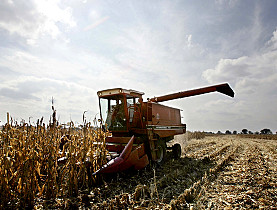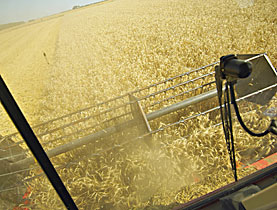Swiss optimistic ahead of WTO talks

Swiss Economics Minister Doris Leuthard is confident an international meeting in Geneva this week aimed at concluding global trade talks will be successful.
Representatives of World Trade Organization members will attempt to end the so-called Doha round, which calls for cuts to tariffs and subsidies that constrain exports but has stumbled so far on sensitive issues such as agriculture.
Leuthard said on Sunday that Switzerland considers the conclusion of the round important. She added that she would fight over every point to be negotiated and refused to consider failure an option.
“We are optimistic and pragmatic, and we want a result,” she said.
Leuthard said that the government wanted solutions that went beyond the agricultural and industrial goods sectors. “For Switzerland, areas such as services and geographical indications are also very important,” she added.
However, proposed cuts to agricultural tariffs remain a sore point for the economics minister, who believes that net importers of foodstuffs such as Switzerland, with one of the most protected markets, are at a disadvantage.
The cuts would affect mainly highly protected meat and milk produce.
“These proposed reductions would be particularly damaging for Swiss farmers,” said Leuthard. “Thirty per cent of Swiss farmers might have to give up their profession and that is a price I am not prepared to pay.”
Leuthard pointed out that local farmers must uphold high standards of quality and that Swiss farm products were relatively expensive to produce, making it difficult to compete with cheaper imports from developing nations.
Main focus
Agriculture will be the main focus of the talks, and has been the subject of discussions ahead of the meeting. Ministers from three dozen trading powers already met in negotiating alliances on Sunday.
The various alliances among the WTO’s 152 members, from the Cairns group of food exporters to the African, Caribbean and Pacific (ACP) countries met to plot their strategy.
It has become clear that the level of United States farm subsidies would be an early bone of contention.
US Trade Representative Susan Schwab has said her country is ready to make “enormous” cuts in farm support, which developing countries say distorts international trade and squeezes their own farmers out of the market.
The latest WTO proposals call for a cut of about 70 percent in US subsidies, lowering them at least to $16.4 billion (SFr16.8 billion).
But that figure refers to the ceiling negotiated at the WTO, rather than the actual or applied amount paid out by the US government, which is now running at half that level, or about $7 billion, thanks to soaring world food prices.
Ministers at the talks will be watching keenly to see whether Schwab makes a new offer on farm subsidies. The new US Farm Bill, which raises support, has led many WTO members to doubt Washington’s good faith in the talks.
Bananas were also a topic of discussion on Sunday, after the European Union walked out of talks late on Friday saying Latin American countries had refused to sign up to a compromise in their long-running dispute about the fruit.
Ecuador, the world’s top banana exporter, said it wanted to negotiate further, and believed a deal could be reached before the trade talks get under way.
Failure to defuse the bananas dispute could derail the entire round, as it would then become part of the farm talks, pitting the Latin Americans against the ACP countries.
swissinfo with agencies
Launched in the Qatari capital in November 2001, the WTO’s latest liberalisation talks known as the Doha Round have struggled to overcome many countries’ fears of exposing sensitive agricultural and manufacturing industries to more competition.
The negotiations broke down in July 2006, well past the original deadline of January 2005.
Despite, the key elements for an overall deal are now relatively clear. The United States would cut its farm subsidies, blamed by poor countries for squeezing their farmers out of the market.
The European Union would open its protected market for food by cutting agricultural tariffs, giving developing country food exporters such as Brazil new opportunities.
And developing countries would cut their industrial tariffs, opening their markets to manufacturers in rich countries. Other elements would include a boost to trade among developing nations and liberalization of services such as banking and telecoms.
But developing countries want waivers to tariff cuts to protect their subsistence farmers and fledgling industries, while rich nations say they cannot sell the sacrifices being asked of them unless they can point to gains in market access elsewhere.

In compliance with the JTI standards
More: SWI swissinfo.ch certified by the Journalism Trust Initiative










You can find an overview of ongoing debates with our journalists here . Please join us!
If you want to start a conversation about a topic raised in this article or want to report factual errors, email us at english@swissinfo.ch.